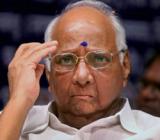
New Delhi, July 31: An Empowered Group of Ministers on drought, headed by Agriculture Minister Sharad Pawar, is scheduled to meet on Tuesday for deciding on relief measures to tackle drought-like situation in some states that has led to fodder and water scarcity.
As of now, monsoon rains are deficient by 21 per cent across India, affecting sowing of kharif crops. Karnataka, Maharashtra, Gujarat, Haryana, Punjab and West Rajasthan have been the worst-hit regions this year.
On Sunday, Pawar had said the country could face serious situation if rains do not occur in next two months.
Sources said the Empowered Group of Ministers (EGoM) would primarily focus an addressing fodder and water scarcity, besides insulating farmers from higher input cost.
The panel would also discuss steps such as the possibility of stockholding limits and ban on futures trade in agri-items for controlling food inflation. Pointing out that the scarcity of fodder and water was a major cause of concern in most states facing drought-like situation, sources said the EGoM is expected to deliberate on evolving a water management plan to ensure judicious use of water besides providing sufficient supply of fodder.
That apart, the EGoM may discuss providing subsidy on power and diesel for farmers and also take a view on relief packages sought by the state governments, particularly Karnataka, Maharashtra and Punjab, the source added. The government has conceded that production in 2012-13 would be lower than the last year's record output.
"It is certainly not possible to achieve 257.44 million tonnes of foodgrains production this year. It is too early to say how much would be the actual fall in output," Agriculture Secretary Ashish Bahuguna told PTI last week.
Sowing area of total kharif crops has declined by 10 per cent so far at 66.82 million hectare. Coarse cereals is worst affected with 23 per cent shortfall, followed by pulses (18 per cent), paddy (9 per cent) and cotton (7 per cent).
The country had faced severe drought in 2009 which had brought the foodgrain production down to 218 million tonnes.
The EGoM will also consider a proposal by the Rural Development Ministry to provide safe drinking water to states affected by drought-like conditions. The ministry has proposed to provide Rs 15 crore, Rs 12 crore and Rs 11 crore to Maharashtra, Karnataka and Rajasthan, respectively, to help them ensure availability of drinking water in districts affected by drought-like situation, sources said.
"The issue of providing safe drinking water was raised by Agriculture Minister Sharad Pawar in a meeting held on July 26," they added. The Rural Development ministry plans to provide the amount to the affected states withing 15 days of its approval by the EGoM, sources said.





Comments
Add new comment